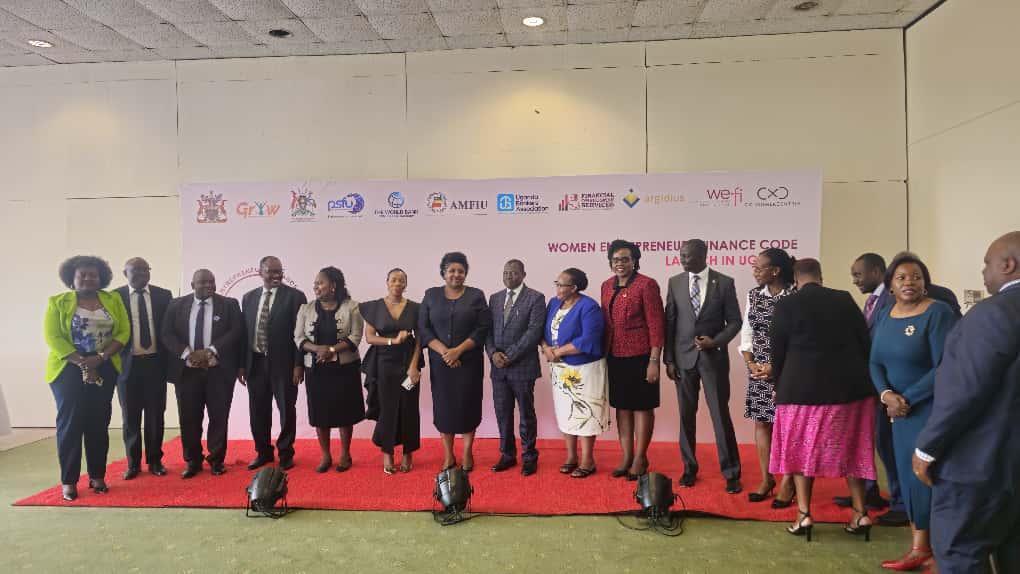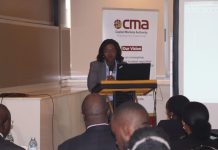Africa-Press – Uganda. Uganda has officially joined a global movement to expand financing for women entrepreneurs with the launch of the Women Entrepreneurs Finance (WE Finance) Code, a data-driven initiative aimed at increasing access to capital for women-owned and women-led micro, small, and medium enterprises (WMSMEs).
The launch event, held in Kampala, brought together senior government officials, financial regulators, development partners, private sector leaders, and financial service providers, all of whom pledged to transform Uganda’s financial landscape through gender-responsive financing.
The WE Finance Code, introduced at the 2023 World Bank–IMF Annual Meetings in Marrakech, is currently being rolled out in more than 30 countries, including Kenya, Rwanda, Nigeria, Tanzania, Senegal, Mozambique, and Egypt. Over 350 financial institutions worldwide have signed on, making it one of the largest international efforts to close the gender financing gap.
With Uganda’s adoption, the country joins a growing coalition of governments and financial actors committed to strengthening access to finance for women-led enterprises, an area long hindered by structural barriers such as collateral limitations, high interest rates, informality, and gender bias in lending practices.
The launch was coordinated by Uganda’s National Steering Committee, which includes the World Bank, Ministry of Gender, Labour and Social Development (MoGLSD), Bank of Uganda (BoU), Uganda Bankers Association (UBA), Association of Microfinance Institutions of Uganda (AMFIU), Private Sector Foundation Uganda (PSFU), Nshuti Financial Consumer Advisory Centre, Arigidus Foundation, and Consumer CentriX.
During a symbolic signing ceremony, banks, microfinance institutions, SACCOs, and other financial service providers publicly committed to strengthening institutional leadership on women’s financing, improving the collection and reporting of sex-disaggregated data, developing tailored credit products for WMSMEs, and enhancing transparency and accountability.
Regulators, policymakers, and development partners will oversee these commitments to ensure they translate into measurable progress.
Presiding over the event, State Minister for Gender and Culture Affairs, Peace Mutuuzo, described the launch as a “transformative moment” for Uganda. “We have moved from awareness to action,” she said.
“This is the beginning of a journey toward creating a more equitable financial ecosystem for women across our nation.”
The Minister highlighted the persistent obstacles facing women entrepreneurs, including informality, lack of certification, and limited collateral. She noted that even under concessional arrangements provided through the GROW Project, many women still fail to qualify for loans because they lack acceptable security.
“This reinforces the need for innovative solutions to address the collateral issue,” she said, calling on financial institutions to adopt alternative collateral models and gender-intelligent product designs.
Celebrating the launch of the National Gender Data and Financial Inclusion Dashboard by the Bank of Uganda, Mutuuzo underscored the importance of gender-disaggregated data: “What gets measured gets changed.”
She pledged the government’s commitment to fully implement the WE Finance Code, strengthen gender-responsive policies and programs, monitor institutions for compliance, and share best practices across the sector.
Aggrey David Kibenge, Permanent Secretary of MoGLSD, highlighted the WE Finance Code as a key contributor to the National Development Plan.
He noted its alignment with Uganda’s strategic goals of inclusive growth, poverty reduction, gender equality, and women’s empowerment.
Kibenge emphasized that while women lead more than half of Uganda’s 2.5 million businesses, many still struggle to access formal credit.
He described the Code as a shift from years of discussion to an actionable framework with clear responsibilities for financial institutions, regulators, and government agencies. “This is not an isolated initiative,” he said.
“It complements programs such as the Parish Development Model (PDM), UWEP, and the GROW Project. Together, these interventions are building an ecosystem where women-owned businesses can thrive at scale.”
Ms. Francisca Ayodeji Akala, World Bank Country Manager for Uganda, praised the country’s leadership and its potential to become a regional champion for women’s economic empowerment.
“With over 50% of Uganda’s businesses owned or led by women, the country has one of Africa’s strongest entrepreneurial profiles,” she said. “Yet only one in four women-led businesses has access to formal finance.”
Ms. Akala cited that women-owned SMEs globally face a financing gap of US$1.7 trillion, interest rates for women-led MSMEs in Uganda can reach 22%, and closing the gender finance gap in Uganda could generate US$277 million in additional revenue for the financial sector.
She emphasized that the WE Finance Code provides a crucial framework for data-driven decision-making, institutional alignment, and accountability.
Through the GROW Project, the World Bank will support the development of a national women-led MSME data dashboard, a unified national definition for women-owned businesses, coalition-building and coordination, and capacity-building for financial institutions.
“This is the foundation for systemic change,” Ms. Akala affirmed, applauding the Bank of Uganda, MoGLSD, PSFU, UBA, AMFIU, and all financial institutions signing onto the Code.
Uganda will implement the WE Finance Code through a structured roadmap that focuses on expanding enrollment of financial service providers, including banks, MFIs, SACCOs, mobile money operators, fintechs, and digital lenders.
The roadmap also prioritizes strengthening national coordination through a multi-stakeholder WE Finance Code Coalition that will harmonize reporting, oversee implementation, and align the Code with existing national financial inclusion efforts, while enhancing gender-responsive policies and integrating WE Finance commitments into national financial inclusion strategies, credit market guidelines, and regulatory frameworks.
The launch of the WE Finance Code marks a pivotal moment for Uganda’s financial sector. It solidifies the country’s commitment to dismantling structural barriers, creating new financing models, and ensuring that women-owned businesses receive the support they deserve.
As Uganda joins the global coalition for gender-responsive finance, stakeholders across government, financial institutions, and development partners share one mission: to ensure every Ugandan woman entrepreneur has the opportunity to thrive.
For More News And Analysis About Uganda Follow Africa-Press






